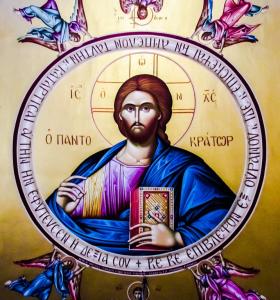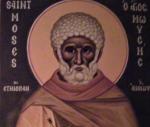
God transcends all names, even the name of God. But, to deal with God, we give God many names, coming both from our experience with God and from revelation. They reflect the various activities of the one we call God; we must not confuse the names, and how we understand them, as being univocal with the way they are in the divine nature itself.
Because of the way our minds work, as they seek to divide even things which are indivisible in order to better apprehend them, it is extremely difficult for us to understand the reality of divine simplicity. We can ascertain it is true, both from revelation, and but also from metaphysical deductions, but even though we accept it is true, our way of dealing with God is not so simple. We look at God in relation to the variety of names and ways God seems to work with us and the rest of creation.
God is one; all God’s activities (energies) must, in some sense, be said to be one, not plural, even as they must, in themselves, reflect nothing other than what God is. That is, we apprehend the one unchanging activity of God in a variety of ways, each representing, as it were, a different activity. It is a logical, not a real, distinction we make. Similarly, the way we logically discuss those energies in relation to God’s divine nature must give way to the truth of God’s oneness. God is what God does, and what God does is what God is.
Pseudo-Dionysius gives us various ways we have come to know God, each of which provides us a name which we can and do use for God:
And yet on the other hand they give it many names, such as “I am being,” “life,” “light,” “God,” the “truth.” These sane wise writers, when praising the Cause of everything that is, use names drawn from all the things caused: good, “beautiful,” “wise,” “beloved,” “God of gods,” “Lord of lords,” “Holy of Holies,” “eternal,” existent, Cause of the ages. They call him source of life, wisdom, mind, words, knower, possessor beforehand of all the treasures of knowledge, power, powerful, and King of Kings, ancient of days, the unaging and unchanging, salvation, righteousness, and sanctification, redemption, greatest of all and yet one in the still breeze. They say he is in our minds, in our souls, and in our bodies, in heaven and on earth, that while ever remaining within himself he is also in and around and above the world, that he is above heaven, and above all being, that he is sun, star, and fire, water, wind, and dew, cloud, archetypal stone, and rock, that he is all, that he is no thing. [1]
God is no thing, not even, really God, as even the name God is one of the names which we predicate to God in relation to our understanding of what it means for God to be God. The name God, as with all names we can give to God, reflect our own limited apprehensions of the divine nature. The divine nature itself transcends all things, all names, even that of Godhood, indeed, even being itself – though each of those names can be said to be a quality of God because they show us something about the way God interacts with creation. The more we experience qualities such as goodness, truth, wisdom, or holiness, the more we will apprehend them, and the more we apprehend them, the more we will be able to integrate them into ourselves. As we integrate them into ourselves, we will find them transforming us, making us more and more like God. And yet God, the source and foundation of all those qualities, remains beyond them, and so will always transcend whatever we become.
While we experience those qualities and activities is in a divided manner, it is important to always keep in mind that for God, they are all one. In and with God, all the names, all the qualities, however we name them and experience them, are not other than all the other qualities. That is, as St. Gregory Palamas tells explained:
The supreme Intellect, the uttermost Good, the Nature which transcends life and divinity, being entirely incapable of admitting opposites in any way, clearly possesses goodness not as a quality but as essence. Hence everything that we can conceive of as good is to be found in It or, rather, the supreme Intellect both is that good and surpasses goodness.[2]
God, the divine nature, transcends goodness itself, as it is the source of goodness, and yet all it is contains in it goodness, but in a way which unites goodness with other divine qualities, such as wisdom, beauty, holiness, and love. God’s goodness is not other than God’s love, which is not other than God’s wisdom. This is why, the more we apprehend one of those qualities, one of those energies of God, they can and will also transform us so we begin to take on all those other qualities as well: the more we embrace God’s goodness and become good, the more we will find ourselves becoming more loving, and in that lovingness, more beautiful, indeed, more holy. What is key for us is to embrace the grace of God which comes to us, and in that grace, we will find ourselves partaking of God’s uncreated energies, and through it, all the various qualities of God. In this way, not only will we fulfill our natural potential, we will transcend it, growing more and more like God throughout eternity.
Jesus, as the one mediator between God and creation, works to unite creation with God. All things come about through the Logos (cf. Jn. 1:1), all things are sustained by the Logos, and therefore, all things find their consummation in the Logos, the consummation which can be described as salvation. “I am the door; if any one enters by me, he will be saved, and will go in and out and find pasture” (Jn. 10:9 RSV). All will go through the Logos to find their in God. Through the Logos, they will be able to unite with God and experience eternal theosis. How Jesus does this, Jesus does not specifically say here, but we can take what the author of the Book of Hebrews says, and use it as a foundation for an answer. Jesus, in the incarnation, became the great high priest over all creation, becoming both the sacrifice and sacrificer, offering himself as a sacrifice of love to both God the Father and to us. When we accept that sacrificial love, we find ourselves joined with the Father who likewise accepts that love. That is, Jesus offered all that he is in his self-sacrificial love so that all things can receive the bounty he possesses and so find themselves brought back or reconciled to God:
For it was fitting that we should have such a high priest, holy, blameless, unstained, separated from sinners, exalted above the heavens. He has no need, like those high priests, to offer sacrifices daily, first for his own sins and then for those of the people; he did this once for all when he offered up himself. Indeed, the law appoints men in their weakness as high priests, but the word of the oath, which came later than the law, appoints a Son who has been made perfect for ever (Heb. 7:26-28 RSV).
The perfection of God is revealed to us in the incarnate Logos, who as God, assumed human nature, became man, and revealed to us the great love of God for us and all creation. He “lowered” or emptied himself so that all that was “lower” can be “raised up” and partake of the all-deifying grace of God. What was imperfect in creation could become perfect by the grace released by Jesus’ self-love. God’s perfect love is shared with all, giving all the grace they need, the grace which, once accepted, will transform them so that they become what they were created to be, images and likenesses of God. They will be able to become holy like God is holy, a holiness which is not other than love itself.
[1] Pseudo-Dionysius, “The Divine Names” in Pseudo-Dionysius: The Complete Works. Trans. Colm Luibheid (New York: Paulist Press, 1987), 55-6.
[2] St. Gregory Palamas, “Topics of Natural and Theological Science and on the Moral and Ascetic Life: One Hundred and Fifty Texts,” in The Philokalia: Volume IV. Trans. and ed. G.E. H. Palmer, Philip Sherrard, Kallistos Ware, et. al. (London: Faber and Faber, 1995), 359 [#34].
















